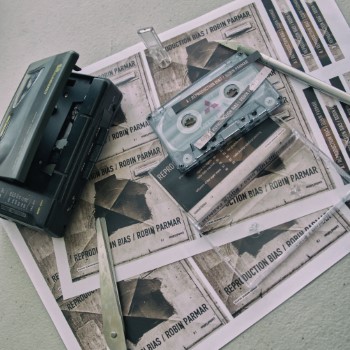Reproduction Bias
Robin Parmar

File under: noise, feedback
Reproduction Bias is a C60 tape release that documents a process both technological and phenomenological.
My first recording experiences were with my friend Chris, dubbing sounds back and forth between two tape decks. Later came four-track Portastudios, with their finicky alignment and laughable noise reduction. University journalism was facilitated by a Marantz deck considered "portable" at the time. Darned thing was a brick! Later, a Sony Pro Walkman was my mainstay... until its ignominious death by motor burn-out.
Cassette culture was an important aspect of the medium. Experimental tapes were passed back and forth through the mails, like an early internet of shared experiences. Culturally, tapes say something to me that other media don't. They can be made and personalised in a manner unlike anything before or since. I had an entire wall of tapes with custom art covers, and knew several friends who did likewise.
In 2016 I got to thinking about what sort of music I might make NOW with the constraint of tape as the delivery medium. It would be something with political resonance. It would push the limits of what was sonically possible using a narrow band of rust and glue.
The result was a C60 of entirely new music basic on feedback experiments and field recordings. Reproduction Bias was made available in a postcard edition of one. Yep, one copy. This was submitted to The Postcard Show 2016, an annual fundraiser for the Sirius Arts Centre. I based the sounds on recordings I'd made during my residence in the strange town of Cobh, Ireland.
The music starts quiet but then gets very loud. There are eight tracks per side, but not all are named. Invent your own titles for the rest.
A2. propagation and dissemination A4. repeal the eighth A5. finite state machine A7. influence of the super moon
B2. forceful phenomenon suite B4. thiamine facet inset B5. the graphite heel B7. radio isotope sandman painting
casette release code: 2024M01
This second edition of six copies will be sold exclusively through Stolen Mirror. Each tape is being recorded by hand in an exacting manner. The process is recursive. The first tape is recorded from the master. Then this is played back to record the second tape. And so on. The sixth tape will then be a response to the cumulative effect of six generations of recording.
Each tape will cost progressively more than the one before. All profits will be donated.
Released 1 August 2024.
digital release code: 2024D01
A digital edition of the original files will be made available.